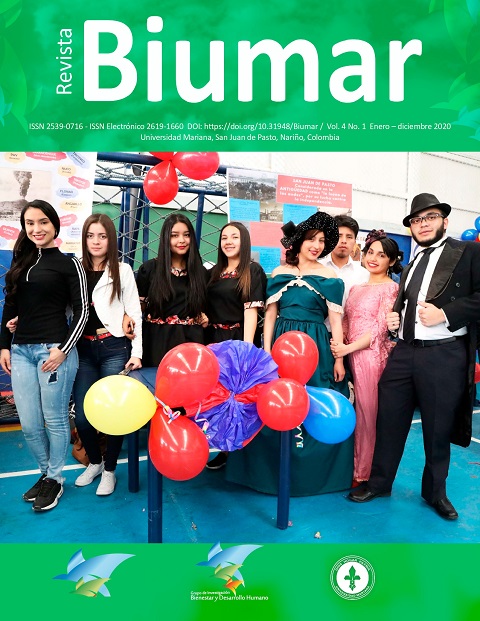A systematization of psychosocial experience in: Family care, family psychoeducation, support networks
DOI:
https://doi.org/10.31948/BIUMAR4-1-art14Keywords:
systematization of experiences, inter-institutional connection, contribution of the program to relatives, acceptance of the protocol, sychosocial approach of an interdisciplinary teamAbstract
The purpose of this investigation was to provide a psychosocial accompaniment to the relatives of the deceased soldier who is active in the military forces in a comprehensive way, to handle grief over the loss of a loved one and the new functionality of the home without his presence, so it is important to keep family psychoeducation in mind. For this, the interdisciplinary team of the institution participated (psychology, social worker, chaplain, military man in charge of the welfare process of the military unit and the activation of the inter-institutional and family support network).
The systematization experience was carried out in March 2019, with the death of a military personnel in a critical public order area in the Colombian Pacific region, accompanying protocols being activated through three moments or times of intervention: Moment 1, Attention before and during the funeral, structured for the accompaniment, from the knowledge of the news of the death in the military unit to the funerals carried out. Moment 2. Follow-up to the relatives of the deceased after the funeral. Moment 3. Third follow-up divided into two parts: an initial one where telephone contact was made the third month of the funeral; the second part of this last moment was the face-to-face visit, for a single grief management session.
The methodology was framed from a qualitative methodological paradigm, following an interpretative approach and its type was systematization of experiences. The results allow us to assess the relevance of the military institution to deal with the events since the death of the military and the timely attention to the relatives in the care of mourning and the interdisciplinary management that occurs in the middle of the process, allowing a psychoeducation to the family that shows a new adaptation to the loss of the loved one.
Author Biographies
Astrid Constanza Vergara Buitrago
Psicóloga (Universidad Santo Tomás); Especialista en Psicología Clínica (Universidad Católica); Especialista en evaluación y diagnóstico neurológico (Universidad San Buenaventura); Magíster en Neuropsicología (Universidad San Buenaventura); Directora de Bienestar y Familia, Armada Nacional. Candidata a optar por el título de Especialista en Familia (Universidad Mariana)
Dubys Delith Olivero Luna
Psicóloga (Universidad Nacional Abierta y a Distancia UNAD). Psico-orientadora del Centro Educativo San Juan Bautista, Sincelejo-Sucre. Candi-data a optar por el título de Especialista en Familia (Universidad Mariana)
Linda Mendoza López
Psicóloga (Universidad Cooperativa de Colombia); Asistente de espacios amigables en Save the children. Candidata a optar por el título de Especialista en Familia (Universidad Mariana)
Luis Carlos Rosero García, Universidad Mariana
Psicólogo, Magíster en Etnoliteratura, Profesor Investigador de Psicología (Universidad Mariana). Integrante del Grupo de investigación Desarrollo Humano y Social, escalafón A en Colciencias
References
Giraldo, C., Mesa, D. y Zuluaga, K. (2018). Acciones institucionales para el manejo del duelo por el fallecimiento de un compañero de trabajo (Trabajo de Grado). Escuela de la Policía Nacional de Colombia. Recuperado de http://biblioteca.policia.edu.co:8080/handle/123456789/1190
Guayambuco, D. (2015). Ruta de atención psicológica y de acompañamiento a la familia, ante la muerte de un ser querido en el servicio funerario (Trabajo de Grado). Fundación Universitaria Los Libertadores. Recuperado de https://repository.libertadores.edu.co/handle/11371/359
Martinic, S. (1984). Algunas categorías de análisis para la sistematización. Recuperado de https://repositorio.uahurtado.cl/handle/11242/9023
Martín-Beristain, C. (2010). Manual sobre perspectiva psicosocial en la investigación de derechos humanos. Bilbao, España: Editorial Hegoa.
Ministerio de Defensa Nacional. (s.f.). Política Integral de Bienestar del Sector Defensa. Recuperado de https://www.justiciamilitar.gov.co/irj/go/km/docs/Mindefensa/Documentos/descargas/Prensa/Documentos/politica_bienestar.pdf
Moreira, M. (2002). Investigación en Educación en Ciencias: Métodos Cualitativos. Recuperado de http://www.if.ufrgs.br/~moreira/metodoscualitativos.pdf
Moreno, M.A. y Díaz, M.E. (2016). Posturas en la atención psicosocial a víctimas del conflicto armado en Colombia. El Ágora U. S.B . 16(1), 198-213. https://doi.org/10.21500/16578031.2172
Neimeyer, R. (2007). Aprender de la pérdida. Una guía para afrontar el duelo. Barcelona, España: Paidós Ibérica.
Presidencia de la República de Colombia. (1990). Decreto Ley 1211 de 1990 "por el cual se reforma el Estatuto del Personal de Oficiales y Suboficiales de las Fuerzas Militares". Recuperado de http://www.suin-juriscol.gov.co/viewDocument.asp?ruta=Decretos/1243823
Rodríguez, A., Ruíz, R. y Restrepo, M. (2004). Intervención familiar para el manejo psicológico en pacientes oncológicos con mal pronóstico en el Hospital de la Misericordia. Revista Colombiana de Psicología, (13), 90-101.
Sluzki, C. (2009). La red social: fronteras de la práctica sistémica. Barcelona, España: Editorial Gedisa
Worden, J.W. (1997). El tratamiento del duelo: asesoramiento psicológico y terapia. Barcelona, España: Editorial Paidós.
Wordpress.com. (2012). Los paradigmas de Kuhn. Recuperado de https://filotecnologa.wordpress.com/2012/03/10/los-paradigmas-de-kuhn-2/
Yoffe, L. (2015). Rituales funerarios religiosos, apoyo y consuelo en los duelos. Revista R emanso (18), 90-107.
How to Cite
Downloads
Downloads
Published
Issue
Section
License

This work is licensed under a Creative Commons Attribution 4.0 International License.
Revista Biumar es publicada por la Editorial UNIMAR de la Universidad Mariana bajo los términos de la licencia Creative Commons Reconocimiento 4.0 Internacional (CC BY 4.0)






